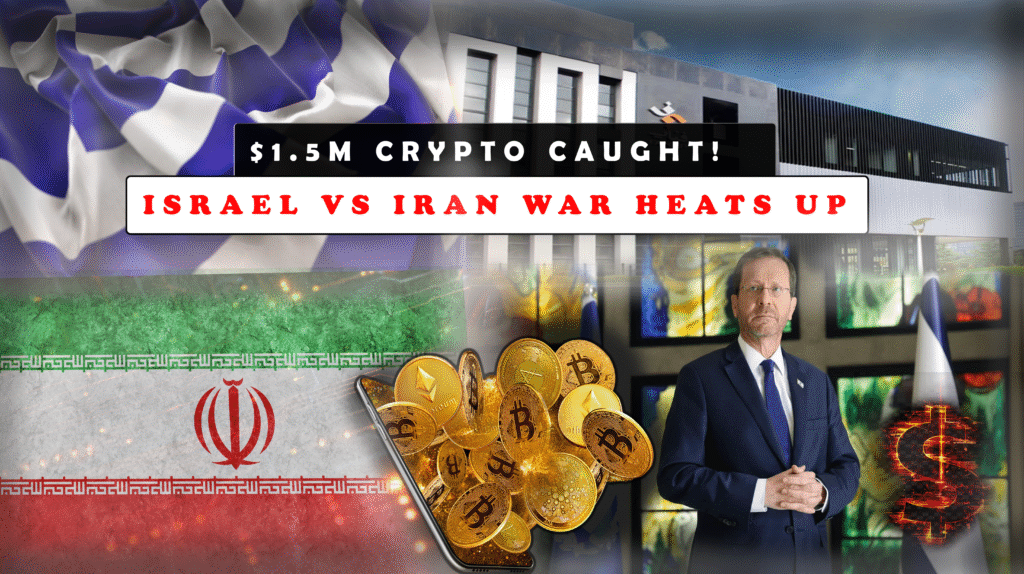
In another major action to block local funds transfer systems, the Israeli Defence Ministry has provided details of its seizing of some 1.5 million dollars worth of cryptocurrency in digital wallets that supposedly belonged to Iran. The operation highlights the efforts by Israel to tighten the use of digital resources in financing hostile operations in the Middle East.
Details of the Seizure
Official reporting states that a wallets-based intelligence-led raid led to the seizure of the confiscated cryptocurrency, according to the officials who reported that some wallets were being used to make a financial transfer involving Iranian entities. These wallets were said to be part of a wider web that was used to circumvent international banking laws and transfer money to groups that do not work in the interests of Israel.
According to the statements made by Israel Defence Minister Yoav Gallant, the operation is only one of the components of the larger plan to strangle the financial lifeblood of hostile groups. Security agents associated that the assets that had been seized were related to institutions and people that had earlier been designated in connection to financing of terrorism.
The Role of Cryptocurrency in Regional Financing
Israeli officials have been threatening over the years about the increasing dependence of Iran on blockchain technology to conceal its financial operations and transfer funds beyond the banking sector. The most common cryptocurrencies include Bitcoin, Tether and other stablecoins because of their cross-border availability and comparative pseudo-anonymity.
It is not the first time that such operation is conducted. Israel declared in July 2023 that it seized millions of dollars in digital assets attributed to Iran and Hezbollah. Likewise, other organizations that have been running in the Gaza Strip, such as Hamas, have been reported to seek cryptocurrency donations.
International Context
This capture occurs when the tensions between Israel and Iran are great, especially with the growing influence of Tehran in the region and its nuclear aspirations. The list of Iranian banks, companies, and individuals that has been sanctioned by the international community is long and many players are forced to find other ways to finance themselves, including cryptocurrencies.
The U.S Treasury Department has also in the past flagged Iran as using virtual currencies to avoid economic sanctions. In 2018, Washington charged two Iranian citizens with operating a mass ransom enterprise where ransom monies were laundered by exchanging cryptocurrency.
Implications of the Move
Capturing these wallets, Israel intends to not only stop the current transactions but also undermine the operations in the future through the disruption of trusting cryptocurrencies as a secure means of making transactions with authorized states and proxies. According to financial analysts, cryptocurrency will bring temporary relief to sanctioned actors in the short run, but it is becoming more traceable as blockchain forensics has improved.
Authorities also emphasized that such networks will demand international collaboration to completely eradicate them since most digital wallets will cut across several jurisdictions. The Israeli government has promised to keep a close eye on blockchain dealings that involve hostile states and groups.
Expert Reactions
Avi Cohen, analyst in the field of cybersecurity: This seizure indicates a high level of efficiency of blockchain analytics. The authorities can now be able to identify and break illicit flows even where there are decentralised financial systems.
Leila Haddad, the financial researcher of Middle East: The utilization of cryptocurrency by Iran is a need and a weakness. The dependence on digital assets ensures that they become visible in a manner that would not be the case in traditional trade-based laundering.
Looking Ahead
The announcement again brings out the increased overlap in geopolitics and digital finance. As an economic opportunity and a financial innovative tool, cryptocurrencies are being weaponized in a way of state and non-state actors, being put under sanctions.
It might be that the seizure of $1.5 million by Israel is insignificant when compared to the more conventional financial investigations, which claim billions of dollars, but it is symbolically important in terms of sending the message: digital assets are not beyond the reach of state forces.
Source
A digital marketer possessing excellent knowledge and skill in off-page, on page and local SEO is competent in the challenging environment. Hard-working, energetic, and a quick learner for any task delegated. Enthusiastic to learn and constantly upgrade knowledge. Mohit brings over 2 years of experience in crafting content that not only ranks well but also provides valuable insights to readers.

